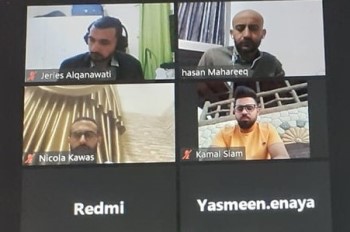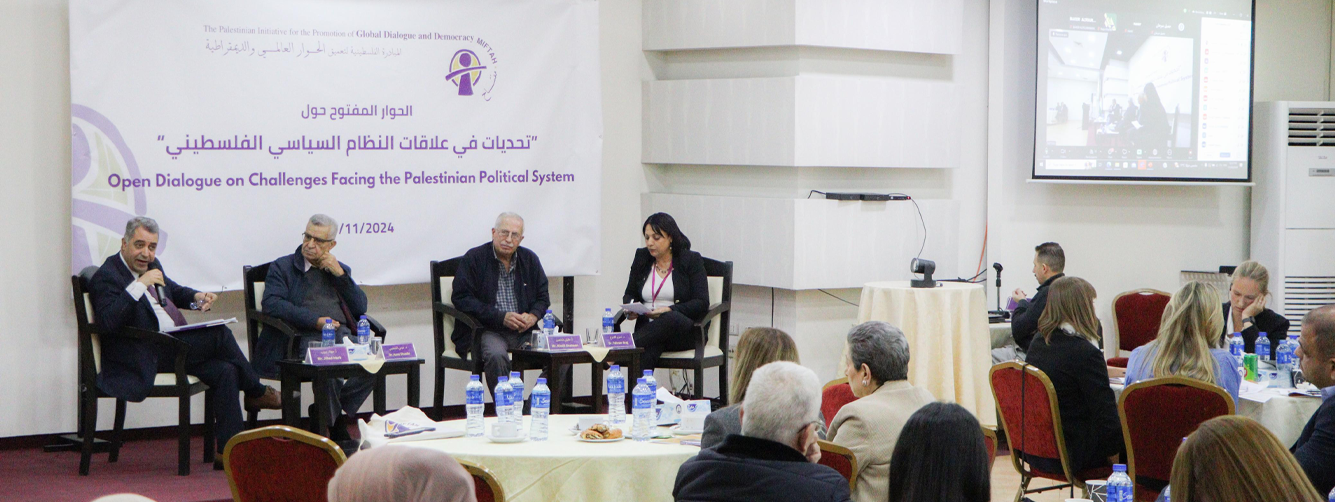
Ramallah – 3/6/2020 Last week, MIFTAH held a Zoom meeting to discuss “The impacts of the Coronavirus pandemic on the political participation of women and youth”.
Participants from the Palestinian Political and Social Active Youth Network explained that the repercussions of the pandemic had surpassed its direct health impacts and negatively affected socioeconomic conditions as well. They maintained that over and above the hindrances already limiting youth participation before the pandemic, the changes that came in tandem with it resulted in an even more complicated situation with tools such conferences, marches and direct campaigns no longer available.
The participants said they believed the coronavirus crisis was the reason for the strong solidarity among various social sectors, which surpassed any political or regional biases. Some of the network’s members who took part in the emergency committees created in their communities after the state of emergency was declared testified to this.
Yousef Sweiti, a member of the Youth Network spoke about his experience throughout this pandemic, indicating that 70% of the volunteers in his Ramallah-area emergency committee were women. He also said the overall feeling of solidarity created by the pandemic prompted a sense of urgency in him to be part of these activities and help people whose livelihoods had been disrupted. “My mission focused on direct relief work,” Sweiti said. “This included facilitating people’s movements and helping them access required services.” Still, this solidarity, according to the participants, only lasted for a short time and was not manifested on the ground as they had hoped. While many emergency committees were formed during the crisis in which various sectors participated under youth leadership, some still suffered from political monopoly and biased media coverage.
The participants highlighted the consecutive crises, which have had an impact on their own political participation. One example, they said, was the unemployment and poverty rates among youth, which ultimately changed their priorities and shifted the direction of the Palestinian youth struggle towards management of their everyday affairs instead of creating a new reality of partnership with the Palestinian political system. Moreover, they said the exploitation of the crisis in favor of changing the social balances of power, coupled with the ongoing state of emergency has stymied any current actions and endeavors. The participants also warned that many demands for rights could be put on hold because the focus was mostly on combatting the epidemic and because of the shift of national priorities at the political and civil levels. For example, throughout this crisis, there have been unprecedented assaults by the Israeli occupation, which were then translated into broader annexation policies targeting the Jordan Valley, parts of the West Bank and Jerusalem.
The participants proposed a number of steps that could reinforce the presence of youth in the current political arena, most importantly carrying out activities to push back against Israeli annexation plans. This could be achieved though intensive media campaigns, which could put Jordan Valley regions back at the forefront of the Palestinian conversation and bring to light the impacts of Israel’s ongoing annexation policies. By increasing media campaigns, this could expose the actions of the Israeli government, which are based on displacement, expulsion of the indigenous Palestinian population and systematic racist measures against the Palestinian people.
At the internal level, the participants called on youth groups to unify their demands to begin a new process of reform based on a National Salvation Council comprised of dominant political figures, whose mission would focus on achieving national unity and preparing for general elections.
The meeting also proposed several initiatives, including the launching of a YouTube channel to disseminate the content and values of the Youth Network and to launch initiatives to help alleviate the difficulties experienced by youth who lost their jobs because of the pandemic. Other initiatives included media campaigns to highlight the rights of marginalized sectors such as women and youth.
The discussion session was part of MIFTAH’s project “Advancing Women Peace and Security”, which it implements with support from the Norwegian Representative Office.








